At the London Book Fair last week, three booksellers--Steve Bercu, owner of BookPeople in Austin, Tex., and president of the American Booksellers Association; Sion Hamilton, retail operations director of Foyles in London; and Hiroshi Sogo, the managing director of AsianBasis Corporation, a subsidiary of the Japanese bookstore chain Books Kinokuniya--discussed how their stores have adapted to the sea changes of the past several years and what they plan going forward.
 |
| Sion Hamilton and Philip Jones |
Hamilton led off at the panel, moderated by Philip Jones of the Bookseller, speaking about Foyles's new flagship store, which is set to open at 107-109 Charing Cross Road on June 11. In the process of designing the store, Hamilton and others at Foyles took the opportunity to "completely question" the natures of both bookselling and their organization. Foyles sought the opinions of everyone from customers and members of the general public to industry experts, retailers in other industries and its own frontline booksellers while deciding on a vision for a "bookshop of the 21st century." In February 2013, in fact, the store co-hosted a conference on just that topic; the event drew an international crowd of writers, publishers, librarians, booksellers and developers.
"At our workshop last year, someone demanded a Yo! Sushi-type conveyor belt of books," recalled Hamilton, referring to an English chain of sushi restaurants that features plates of sushi on conveyor belts. After realizing that bringing conveyor belts into the bookshop wouldn't work, Hamilton thought to invert the idea by displaying books along the store's stairways. "We devised a slot that we cut into the side of the atrium, and we have lecterns that sit at each landing. You can see all those lovely books as you walk up."
The flagship store will have six floors and contain, in addition to bookselling space, a cafe, gallery and atrium. Those three spaces, Hamilton related, can "interact, inform and be informed by the bookshop." The shop's various rooms, he went on, are meant to draw customers through a series of inviting spaces, and through their browsing, customers will be encouraged to discover new writers and break from their usual book-buying habits. And customers, he added, should "revel" in the experience of being surrounded by voices.
In his presentation, Steve Bercu reported that American indies are on an upswing after the downturn that lasted from 2007 to approximately 2009, and that the American Booksellers Association has been adding new members and new stores each year since then. At BookPeople, he added, every year since 2010 has set a new record as the best year in store history.
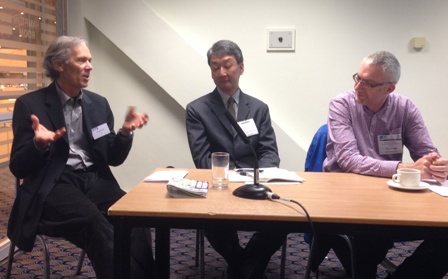 |
| Steve Bercu, Hiroshi Sogo and Sion Hamilton |
"No one has to come to our store to buy a book," said Bercu, who stressed the importance of crafting a great experience for customers. This experience, in whatever form it may take, has to be so compelling that it beats out not only "every conceivable form of entertainment" but also the convenience of lying in bed and shopping on a phone or lap. "I don't know if we're the future, I don't know what we are exactly, but we have a lot of fun doing it."
BookPeople's motto is "a community bound by books," and that determines everything that Bercu and his staff do. In addition to selling books, of course, they run book fairs and festivals (some as far afield as Boston, Mass., and Philadelphia, Pa.), host author events, birthday parties and book clubs, and even have two literary summer camps. In store, they have rows and rows of shelf-talkers, a cafe, BookPeople merchandise (including BookPeople bottled water), and many, many displays.
"These days we have pretty great relationships with publishers," Bercu said. "There was a time when I don't think publishers paid that much attention to indie booksellers, but they certainly do now." When asked about his store's ubiquitous branding, Bercu said that he no longer views other bookshops as competitors. "We're not interested with branding in regard to bookshops anymore. Frankly we don't care about Barnes & Noble anymore; we look at them as cousins now as opposed to enemies… We want to be a focal point for the community. That's what we're working in."
Like Hamilton and Bercu, Hiroshi Sogo stressed the importance of carefully curating customer experiences. Although Books Kinokuniya is a business many times larger than either BookPeople or Foyles--with 64 bookstores in Japan and another 26 across the globe--many of the challenges it has faced, Sogo said, have been the same as those faced by other physical retailers. Among those challenges are drastic price cuts by online retailers, showrooming, the erosion of "disposable time" by things like social networks and an apparent decline in interest in reading among young people.
Sogo called for a "common sense vision" of a return to sanity by creating bookshops that not only focus on experience and customer interaction--with both new books and other people--but also embrace new technology.
"We cannot afford being Luddites," Sogo urged, describing how Kinokuniya customers can search store inventory before they arrive and see whether particular books are in stock. Also in the works is a new Kinokuniya e-commerce platform. "Customers should be able to buy anywhere, anyhow," he said.
Sogo also discussed the necessity of running events and creating interesting, engaging displays. One such display, which came from the conversations of a few young staff members in Japan, involved covering 100 books with special paper so that customers could not see the title or the author, and writing the book's opening line or lines on that paper (Kinokuniya sought the permission of each book's publisher beforehand). The display was up for 60 days, and Sogo reported that the sales were phenomenal. Customers found it fascinating, and it even drew media attention and TV crews.
Sogo said, too, that bookstores need to emphasize hospitality and service. He discussed the Japanese word "omotenashi," which was used to illustrate Japanese hospitality and service in Japan's successful bid for the 2020 Olympics. When interacting with a customer, Sogo said, "you expose yourself as a person. You completely put yourself in front of a customer."
Sogo also commented on seeing other physical bookstores go out of business. "Every time a 'cousin' disappears, we weep," he said. "When Borders closed in Singapore, we were upset. The physical presence of books and bookshops is very important." --Alex Mutter
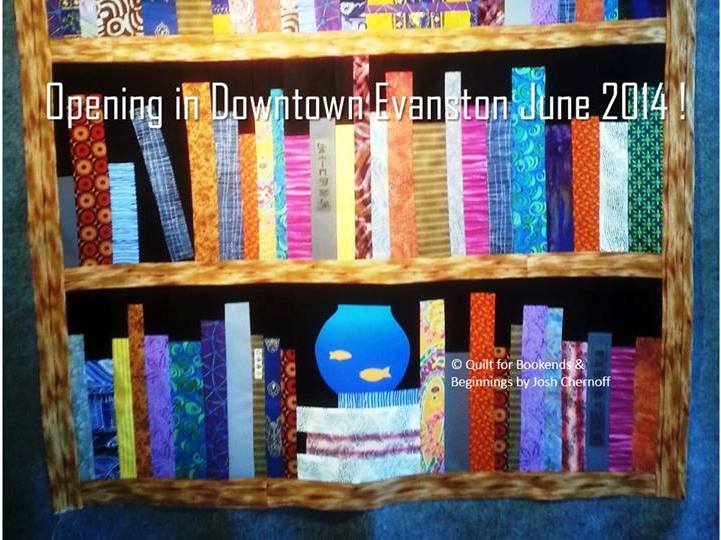 Bookends & Beginnings will open in downtown Evanston, Ill., in early June in space formerly occupied by Bookman's Alley, the longtime antiquarian bookstore. Bookends & Beginnings will feature new and used books, a range of events, gifts and more, with "particular emphasis on titles that will appeal to Evanston's highly educated and multi-ethnic population."
Bookends & Beginnings will open in downtown Evanston, Ill., in early June in space formerly occupied by Bookman's Alley, the longtime antiquarian bookstore. Bookends & Beginnings will feature new and used books, a range of events, gifts and more, with "particular emphasis on titles that will appeal to Evanston's highly educated and multi-ethnic population." Barrett is a longtime Evanston resident, has published literary essays and reviews in the New York Times Magazine, the Nation, Publishers Weekly and other publications and is a trained chef and two-time James Beard Award winner for her radio food reporting for Chicago's NPR affiliate station WBEZ. (She aims to make the cooking section "a destination for cooks and food lovers.") Barrett's husband, Jeffrey Garrett, who recently retired from his job as an academic research librarian, will curate several sections, drawing on knowledge of rare books and specialized collections, European publishing and international children's literature.
Barrett is a longtime Evanston resident, has published literary essays and reviews in the New York Times Magazine, the Nation, Publishers Weekly and other publications and is a trained chef and two-time James Beard Award winner for her radio food reporting for Chicago's NPR affiliate station WBEZ. (She aims to make the cooking section "a destination for cooks and food lovers.") Barrett's husband, Jeffrey Garrett, who recently retired from his job as an academic research librarian, will curate several sections, drawing on knowledge of rare books and specialized collections, European publishing and international children's literature.


SHELFAWARENESS.1222.S1.BESTADSWEBINAR.gif)


SHELFAWARENESS.1222.T1.BESTADSWEBINAR.gif)
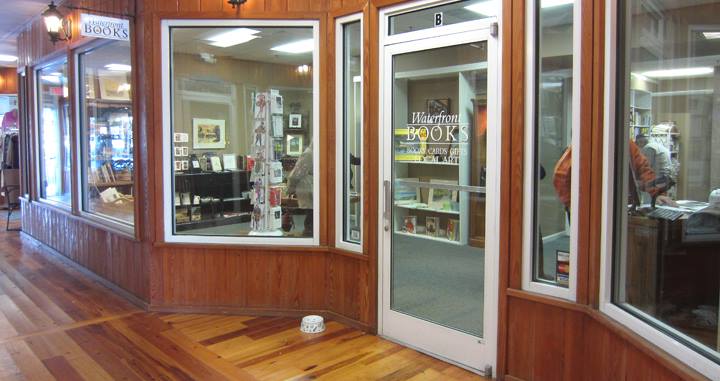 Waterfront Books
Waterfront Books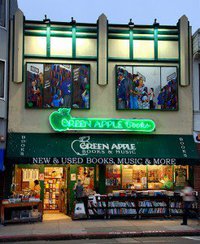
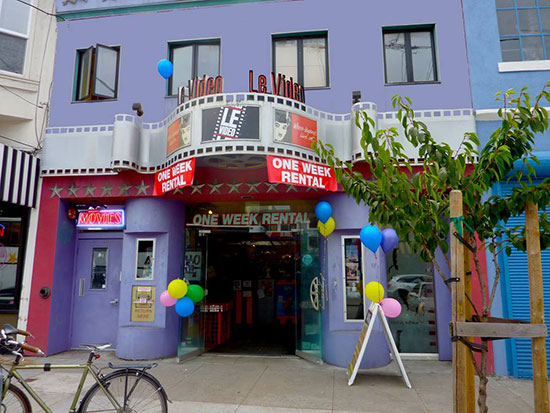 Green Apple Books on the Park will differ in several ways from the main store, which is three times as large. For one, the new store's inventory will be a mix of 75% new and 25% used books, while the current store is 60% used and 40% new. (The new store won't stock CDs and DVDs.) Mulvihill said that the heavier emphasis on new titles is partly because it's easier to control inventory. Because of its size, the new store will have to be more selective than the current store and will tweak inventory as it learns what the neighborhood wants. It's a "lively neighborhood," Mulvihill said, and includes the Park, the Botanical Garden, the de Young Museum, the UCSF Medical Center and numerous cafes and restaurants. The area attracts many tourists.
Green Apple Books on the Park will differ in several ways from the main store, which is three times as large. For one, the new store's inventory will be a mix of 75% new and 25% used books, while the current store is 60% used and 40% new. (The new store won't stock CDs and DVDs.) Mulvihill said that the heavier emphasis on new titles is partly because it's easier to control inventory. Because of its size, the new store will have to be more selective than the current store and will tweak inventory as it learns what the neighborhood wants. It's a "lively neighborhood," Mulvihill said, and includes the Park, the Botanical Garden, the de Young Museum, the UCSF Medical Center and numerous cafes and restaurants. The area attracts many tourists. February bookstore sales fell 6.8%, to $791 million, compared to February 2013, according to preliminary estimates from the Census Bureau. For the first two months of the year, bookstore sales fell 6.6%, to $2.55 billion. Total retail sales in February rose 1.8%, to $386.3 billion, compared to the same period a year ago. For the year to date, total retail sales rose 2.1%, to $776.2 billion.
February bookstore sales fell 6.8%, to $791 million, compared to February 2013, according to preliminary estimates from the Census Bureau. For the first two months of the year, bookstore sales fell 6.6%, to $2.55 billion. Total retail sales in February rose 1.8%, to $386.3 billion, compared to the same period a year ago. For the year to date, total retail sales rose 2.1%, to $776.2 billion.

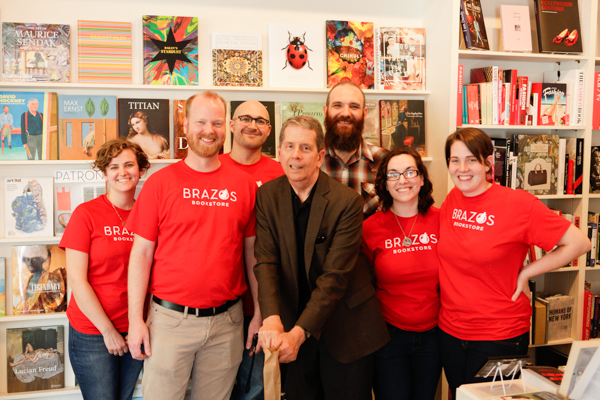
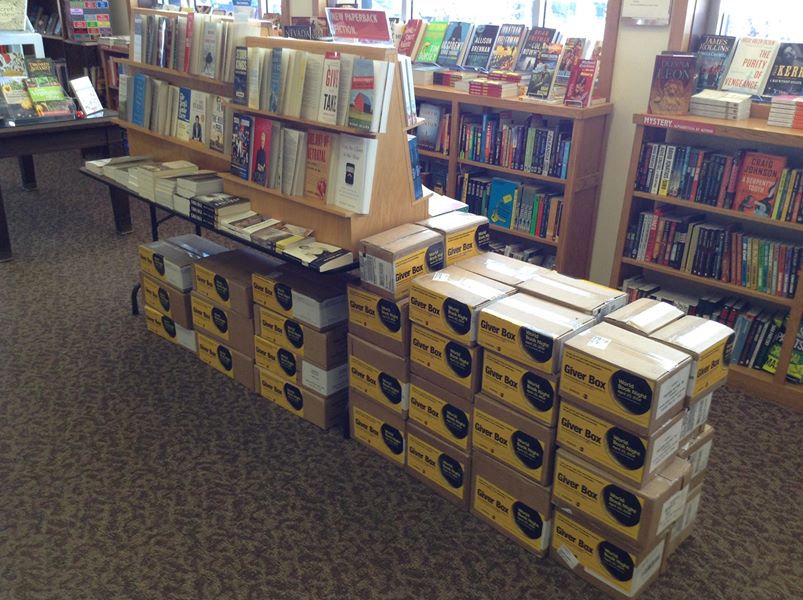 From the Facebook page of
From the Facebook page of 
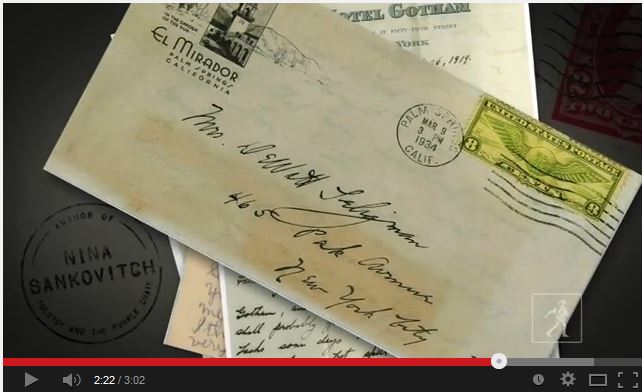

 Fiction: The Goldfinch by Donna Tartt (Little, Brown)
Fiction: The Goldfinch by Donna Tartt (Little, Brown) During the Spanish Civil War, Madrid's Hotel Florida was a meeting point for war correspondents, press officers and foreign intellectuals. Amanda Vaill (Everybody Was So Young) uses the hotel as a focal point to examine the war through the lives of three men and three women. These six individuals--all leftists of various stripes and pedigrees, converging on Spain from all over Europe and the U.S.--allow Vaill to range freely through the history of the war, which raged from 1936 to 1939.
During the Spanish Civil War, Madrid's Hotel Florida was a meeting point for war correspondents, press officers and foreign intellectuals. Amanda Vaill (Everybody Was So Young) uses the hotel as a focal point to examine the war through the lives of three men and three women. These six individuals--all leftists of various stripes and pedigrees, converging on Spain from all over Europe and the U.S.--allow Vaill to range freely through the history of the war, which raged from 1936 to 1939.